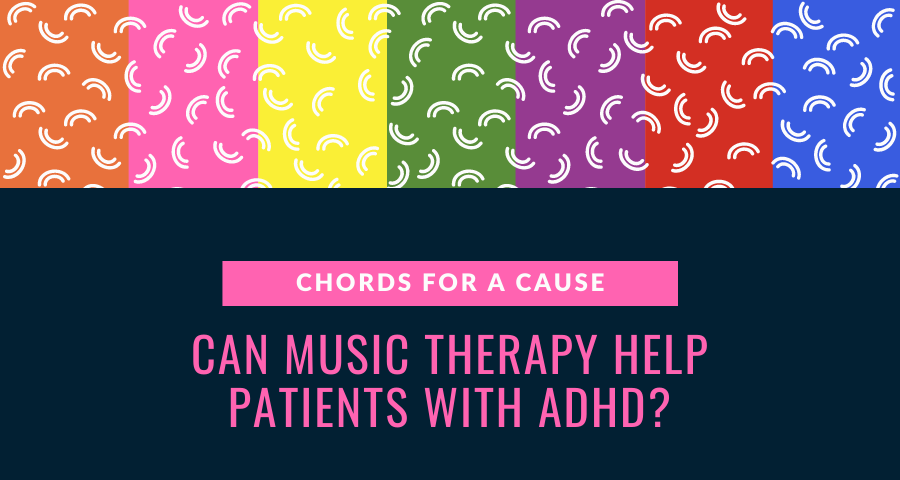Can Music Therapy Help Patients With ADHD?


ADHD, attention deficit hyperactivity disorder, is a prominent neurobehavioral disorder in childhood and adolescence. Though ADHD is a chronic condition with symptoms experienced over a lifetime, ADHD mainly affects children and adolescents. ADHD, often shows up as the inability to concentrate for prolonged periods of time, being unable to follow instructions, having difficulty completing detailed tasks and being prone to error. It can be frustrating to live with, and being unable to fully focus often causes stress. However, music therapy may be able to help and may even increase the ability to concentrate.
Music is an intrinsic part of human existence in terms of responses such as pulse, rhythm breathing and movement, and the whole range of emotions. These connections with music can remain despite disability and illness and so music therapists and counselors can use music to help children (and adults) with a wide range of needs arising from various causes such as learning disabilities, mental and physical illness, physical and sexual abuse, stress and terminal illness. Emotional, cognitive and developmental needs can be addressed through interactive musical experiences.
Music therapy is a form of expressive therapy. One uses music in order to help channel emotions and release the,. There are two forms, one, when one creates music as an emotional release, and the other when one listens to music while performing a creativity activity. Both can be done with one on one with the therapist or in group sessions. For more depth, music therapy is a type of psychotherapy and can also be described as a “systematic process of intervention wherein the therapist helps the client to promote health, using musical experiences and the relationship that develop through them as dynamic forces of change”. Central working modalities in music therapy include free and structured improvisation, listening to music, re‐creating music/playing previously composed music on instruments, singing and writing or improvising songs, and verbal discussion of these music experiences. According to studies, improvisation is perhaps “the most prominent form of musical interaction in music therapy. It has been described as central in many music therapy models.”
Music therapy is potentially a highly effective treatment that could address the core symptoms of ADHD and of the multiple disorders that can coexist with ADHD. For children with ADHD, music therapy bolsters attention and focus, reduces hyperactivity, and strengthens social skills. When you have ADHD, your mind is moving at record speeds. Most of the time you struggle to catch up – let alone make it stop. Being so full of mental and physical energy means it is more difficult to focus for long periods of time. Music is very structured, and this appeals strongly to the ADHD mind. Your mind craves a sense of organization, and every song has a “clear beginning, middle, and end”, making it predictable. “The structure helps a child with ADHD plan, anticipate, and react,” claims Kirsten Hutchison, a music therapist at Music Works Northwest. The beats and rhythm also have specific structures. This can help to refocus the mind as well as encourage better mental (and even physical) organization. An ADHD mind has lower levels of dopamine, but music activates both sides of the brain, engaging your entire brain so the activated “muscles” can work together and be even stronger. Research shows that pleasurable music increases dopamine levels in the brain, and the neurotransmitter is responsible for regulating attention, working memory, and motivation. Patti Catalano, a neurologic music therapist at Music Works Northwest says “music shares neural networks with other cognitive processes. Through brain imaging, we can see how music lights up the left and right lobes. The goal of music therapy is to build up those activated brain muscles over time to help overall function.” Music provides structure, fires up synapses, and it is social. To conclude, music therapy can definitely help with ADHD and it is a recommended method to help get you back on track and in focus when you need to. It won’t be a cure to ADHD of course, but as research explains, music therapy is indeed helpful.
- (PDF) Music Therapy in ADHD and Autism. (n.d.). Retrieved September 21, 2020, from https://www.researchgate.net/publication/326710276_Music_Therapy_in_ADHD_and_Autism
- Board, A., & Board, A. (2020, July 31). The 8 Best Songs for Growing ADHD Brains. Retrieved September 21, 2020, from https://www.additudemag.com/slideshows/music-therapy-for-children-with-adhd/
- ADHD in Children: How Music Therapy Can Be A Good Form Of Treatment. (n.d.). Retrieved September 21, 2020, from https://chadd.org/adhd-in-the-news/adhd-in-children-how-music-therapy-can-be-a-good-form-of-treatment/
- Rodgers, A., & Rodgers, A. (2020, March 17). Music Therapy: Sound Medicine for ADHD. Retrieved September 21, 2020, from https://www.additudemag.com/music-therapy-for-adhd-how-rhythm-builds-focus/
- Zhang, F., Liu, K., An, P., You, C., Teng, L., & Liu, Q. (2017, May 2). Music therapy for attention deficit hyperactivity disorder (ADHD) in children and adolescents. Retrieved September 21, 2020, from https://www.ncbi.nlm.nih.gov/pmc/articles/PMC6481398/
- By ADD-Aadda, P., & ADD-Aadda. (2018, October 09). Can Music Therapy Help With ADHD? Retrieved September 21, 2020, from https://add.org/can-music-therapy-help-with-adhd/

